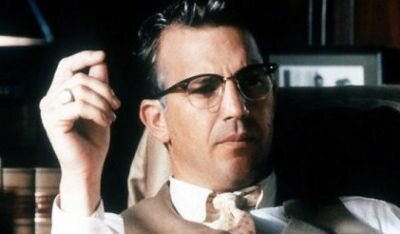
|
| |
| |
|
|
| |
|
|
| |
J. F. K. / JFK
© Unknown - all rights reserved
|
| |
|
|
| |
 |
| Tookey's Rating |
|
|
8 /10
|
| |
| Average Rating |
|
|
8.06 /10
|
| |
| Starring |
Kevin Costner, Sissy Spacek, Joe Pesci  |
| Full Cast > |
|
|
|
| |
Directed by: Oliver Stone 
Written by: Oliver Stone, Zachary Sklar
|
|
| |
|
|
| Tookey's Review |
|
| Pro Reviews |
|
| Mixed Reviews |
|
| Anti Reviews |
|
| Cast |
|
| |
 |
| |
| Released: |
1991 |
| |
|
| Genre: |
THRILLER
BIOPIC
DRAMA
|
| |
|
| Origin: |
US |
| |
|
| Length: |
188 |
|
| |
|
| |
|
|
| |
|
|
New Orleans District Attorney Jim Garrison (Kevin Costner, pictured) refuses to believe that the assassination of President Kennedy was the work of a lone gunman (Gary Oldman).
|
Reviewed by Chris Tookey
|
The most lavish drama documentary of all time, and the ultimate Oliver Stone movie: portentous, enormous (over three hours) and obsessive about the Sixties. Stone's thesis is that Kennedy's assassination in 1963 was not the act of a lone gunman, but a well-organized coup d'etat by people within the American government.
The hero of the film is real-life New Orleans District Attorney Jim Garrison; Stone treats Garrison less as a man than as a peg on whom to hang the research of the past 29 years. This makes for a certain lack of realism: in the movie, he's one lone figure against a disbelieving world, whereas of course there has never been any shortage of conpiracy theorists.
Stone's lack of interest in his official hero (Stone's real hero is Kennedy) is painfully manifest. The Garrison of the film is too flawless to be credible: recognizably a leading man borrowed from a Frank Capra movie. Kevin Costner resists the temptation to play the role with a Jimmy Stewart accent, and reprises the decent but dul performance he gave as Eliot Ness investigating the Mob in The Untouchables. Even so, the final court-room summing-up - where Costner sobs as he talks of messages of support from "the people" but conspicuously fails to make a case against the man he has put on trial for assassinating the President - is risible.
Garrison's domestic scenes are a compendium of cliches, and Stone inadvertently suggests that Garrison may have started the investigation simply to escape from his nagging wife (Sissy Spacek). They are further embarrassing proof that Stone can't write for women: Spacek joins a long list of illustrious actresses who have been weighed down and sunk by Stone.
Another off-putting aspect is that the film is like the swimming pool at a Democrat convention, full of well-known liberals with tiny parts: Jack Lemmon, Walter Matthau, Ed Asner and John Candy all turn up so briefly that the film sometimes seems like an Oliver Stone re-make of Around The World In Eighty Days. The only actors who make much impact are Gary Oldman as Lee Harvey Oswald, Joe Pesci as the bewigged, right-wing homosexual David Ferrie, and Kevin Bacon, who plays a flamboyant amalgamation of several real New Orleans rent-boys caught up in the CIA's anti-Castro activities.
Any notion of documentary realism is further undermined by the director's love of heavy-handed imagery: Stone marches to the crash of symbols. The most grotesque example of this occurs when an entirely fictitious "deep throat" from the military establishment, played by Donald Sutherland, button-holes Garrison and talks to him openly in front of various symbolic Washington landmarks, at a time when (if Stone's thesis were remotely correct) the security services would have had Garrison under round-the-clock surveillance.
Stone spoils his thesis mainly by overstating it. His argument that Kennedy planned to decrease military involvement in Vietnam relies on highly selective use of the available evidence. Stone produces no evidence at all to support his claim that the assassinations of Martin Luther King and Robert Kennedy were part of the same illiberal master-scheme, nor does he offer proof (although Costner states it categorically) that Lyndon Johnson or Edgar J. Hoover were involved.
Stone does build a coherent thesis about how and why Oswald might have been chosen to be the fall-guy; and he demonstrates that the assassination was executed with military precision - but this need not mean, as he seems to think it does, that it was planned by the US military. Stone also produces evidence of a cover-up by the security establishment, but this is hardly conclusive proof that they were responsible for the assassination. Indeed, it seems inconceivable that any conspiracy which allegedly involved politicians, the Pentagon, the CIA, the FBI, the Mafia and armaments manufacturers would have held together for three weeks, let alone three decades.
JFK is over-ambitious, built on dodgy foundations and more than slightly cracked, but - like all magnificent follies - it deserves to be seen, not demolished. Stone organizes a vast amount of exposition so skilfully that Costner's detective-work is never less than fascinating. The film is impressively shot and edited (both departments won Oscars): Stone is ingenious at integrating new with documentary footage. JFK is extremely enjoyable as a paranoid thriller and, though too flawed to be a great movie, is certainly a big, bold, belligerent one.
|
|
|
|
|
|
